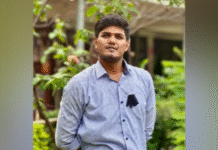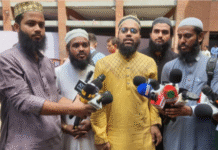Faruque Ahmed
The country’s politics is turning from bad to worse. The Supreme Court order upholding the death sentence to Jamaat leader Mohammad Qamruzzaman for war crimes during the liberation war and the Law Minister’s instruction to the jail authorities to start preparation for execution have added new tension to the country’s already tense political landscape.
BNP led major opposition is busy at the moment with a month long mobilization programme of its grassroots by holding public meetings in major districts towns prior to launching a movement to demand a free and fair election. Political observers fear that the situation may turn worse any time from now.
But the government is not sitting either folding the hands. Awami League is a party with many active leaders and self motivated cadres. However knowing well that its grassroots are not well organized now and had failed to resist the opposition anarchy in the countryside prior to January 5 election, the party has taken a renewed move to reorganize all local units in the next few months.
AS it appears the ruling party is in firm control of the capital and major cities but the government does not want to see that the countryside is slipping out of its hand again in case of any renewed opposition agitation from early next year.
Despite having an unshakable loyalty from police, civil administration and the judiciary, the government has thus further accelerated the use of the court to keep the BNP leaders and other opposition workers on the run so as they can’t mobilize nationwide support for a crucial street showdown.
T op BNP leaders on trials
Reports said about 41 senior BNP leaders are now facing trial in several cases on charges of violence like setting fire on transport vehicles in the streets. Party Standing Committee member Dr Musharraf Hossain has been charge sheeted for issuing threat on PM Sheikh Hasina’s life at a meeting at Jatiya Press Club. The threat is that he had warned her of similar fate of her father if she does not stop repression on the opposition.
Another Standing Committee member MK Anwar is facing trial under the ICT act for blaming a Jubo League leader at a press conference for setting fire at Baitul Mukarram book shops during the Hifajat’s violence on May 5, 2013.
In another swap, Jubo Dal president Muazzam Hossain Alal was arrested with 61 party workers from his Mohammadpur home recently as police charged him for planning sabotage during a Jamaat called hartal in the following day.
BNP Acting Secretary General Mirza Fokhrul Islam on his part is regularly running to the courts to renew the bails to run the party activities avoiding arrest and imprisonment. Moreover party chief Begum Khaleda Zia is facing two other cases and political observers fear she may face conviction if she takes the anti-government agitation to the streets.
These are only few high profile cases while the list of repression on opposition leaders and workers including police case, killing and torture in the capital and throughout rural Bangladesh remained huge. The government however blames the opposition for sheltering terrorism and hatching conspiracy to destabilize the country and kill Prime Minister Sheikh Hasina. We can’t allow them to do it party leaders say.
Observers fear deadly attack on Jamaat
Meanwhile, political observers fear that the government has apparently decided to give the final blow to Jamat- e-Islami which has earned the wrath of the ruling establishment for a strong work force capable of throwing challenge to the government in the streets.
Moreover, in an apparent coincidence of the government preparation to foil the opposition movement and particularly keep Jamaat activists out of city streets, the ICT last week handed over death sentence on war crimes charges to senior party leader Mir Qasim Ali while the Supreme court turned down Mohammad Qamruzzaman appeal for rescinding his death sentence earlier handed over by the ICT.
The ICT also handed over a similar death sentence to Jamaat Amir Maulana Matiur Rahman Nizami on war crime charges in the previous week. Earlier the party supremo Prof Ghulam Azam died at Bangabandhu Sheikh Mujib Medical University Hospital prison cell while serving a 90-yeaar sentence on war crime charges.
Most noticeable is that many crucial decisions and sensitive political actions had crowded out the nation in the past weeks which are enough to turn politics highly volatile. Jamaat has enforced a four-day shutdown last week with a break on Tuesday which was a religious public holiday to protest the death sentences on its senior party leaders thus disrupting the entire week’s business.
The party earlier enforced another shutdown on Thursday in the immediate past week to protest the death sentence of Maulana Matiur Rahman Nizami. Jamaat leaders are consistently denying the charges of war crimes against them saying these are framed up charges; they had no connection with war crimes and that they have been politically targeted. But since Jamaat has opposed the liberation war and actively collaborated with Pakistani occupation forces, their claim of innocence remained largely without buyers.
New law to ban Jamaat?
The question is now how confident Prime Minister Sheikh Hasina is at the moment to be able to handle the unfolding crisis though she appears in firm hold over the country’s political landscape using police to beat the opposition.
The fact – as many have pointed out – is that Sheikh Hasina is not pursuing a politics of compromise at the moment. She wants to stay in power to preserve the achievements of her government, mainly in political front — be it democratically or otherwise although she runs a highly controversial government fraught with basic legitimacy questions.
Observers tend to believe that Jamaat is the government political target at the moment. Apart from trial of its senior leaders; it reportedly introducing a new bill to Jatiya Sangsad soon to make a law to declare Jamaat as an outlawed party. In this matter Awami League has the unequivocal support from Delhi.
Indian Foreign Secretary Sujata Sing’s open lobbying in Dhaka with H M Ershad to convince him to join the controversial January 5 election this year made no secret of Delhi’s intension in Bangladesh politics.
She left Dhaka making sure that HM Ershad’s Jatiya Party will join the polls under Rawshan Ershad’s leadership to bring Awami League back to power to stop the Islamist, terrorist and communal forces from coming back to power.
Awami League, the left political parties in Bangladesh and Delhi held the view together that the elimination of Jamat from Bangladesh politics will make BNP weak and strengthen Awami League’s hold on power for an indefinite period of time.
All Islamist parties threatened
In fact not only Jamaat, all Islamist parties now also feel threatened of their political future. On the other hand, much of the success of the BNP-led anti-government movement at this moment also depends on how BNP leaderships will be able to keep the Islamist in confidence.
This is because the government is working to break the opposition alliance from within and outside in one hand while signals of some senior BNP leaders at times also appear conflicting having the potentials to erode the unity together.
Political observers fear that the country’s politics is entering a new phase of confrontation and conflicts again when more shutdowns may hit the economy and public life and more violence may affect business investment thereby slowing down growth.
The country has a bitter memory of violence and shutdowns prior to January 5 election when the death sentence to Jamaat leader Maulana Delwar Hossain Sayeede had also added new fuel to fire throughout the country. Our political leaders in the government and opposition must not let the nation adrift to identical situation again.
Source: Weekly Holiday









